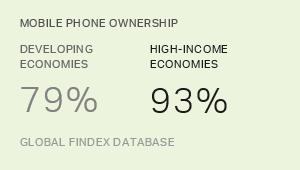PRINCETON, NJ -- Prior to this weekend's unraveling of Wall Street and the re-emergence of the U.S. financial crisis, consumers have been turning less pessimistic about the economy. As gas prices have been declining, the percentage of consumers with negative views of the economy has declined as well, from 83% in mid-July to 70% this past weekend.

What Will Happen to Main Street Consumer Confidence?
Over the weekend, the current financial crisis reached historic proportions, with Lehman Brothers being put into bankruptcy and Bank of America acquiring Merrill Lynch. Other major financial firms also appear to be under serious financial pressure, so additional fallout is possible on Wall Street in the days and weeks ahead. This follows the Bear Stearns bailout earlier this year and the Fannie Mae/Freddie Mac bailout of a week ago.
The Federal Reserve and the Treasury are actively working to maintain orderly financial markets. Even as they undertake these efforts, the key question for the future of the U.S. economy involves how Main Street is going to respond to the virtual elimination of what has been known as the independent investment-banking business.
There will be real-world fallout as the credit crunch intensifies, with lenders becoming even more cautious despite the Fed's best efforts to increase overall financial sector liquidity. In addition, the Federal Open Market Committee meets Tuesday and will announce its efforts to add to the financial system's stability. Although the markets suggest the FOMC may cut interest rates Tuesday, it is not at all clear that this will help the situation.
║┌┴╧═Ї's Consumer Confidence Measure
It is difficult to say how consumers and investors will respond to all of these historic events. In part, it will depend on the way the nation's leaders present the current situation to the public, deal with the reasonable fears of investors, and contain the fallout on Main Street. .
║┌┴╧═Ї's consumer confidence measure classifies consumers into three groups: positive, negative, and mixed. Americans classified as "positive" rate current economic conditions as excellent or good and think the economy is getting better or staying the same. Americans classified as "negative" rate current economic conditions as only fair or poor and think the economy is getting worse or staying the same, while those classified as "mixed" give a combination of positive and negative responses.
║┌┴╧═Ї's consumer confidence measure will provide Americans with a daily reading on what consumers and investors are feeling as the impact of this weekend's events unfolds in the days and weeks ahead. The measure has proven sensitive to economic events, such as the recent decline in gas prices at the pump. It should continue to be so as it helps gauge how the fallout of the current financial crisis affects Main Street even as gas prices continue to decline.
To this point, consumer confidence has been less negative among higher-income Americans than among those having middle and lower incomes, at least in part because of the way gas prices disproportionately affect those least able to afford higher prices at the pump. In sharp contrast, the current financial events are likely to have a disproportionately negative impact on higher-income Americans, particularly investors. In a sense, this suggests that some upper-income consumers who have not been negative on the economy in the past could change their views in the not-too-distant future.
Survey Methods
║┌┴╧═Ї is interviewing no fewer than 1,000 U.S. adults nationwide each day during 2008. The economic questions analyzed in this report are asked of a random half-sample of respondents each day. The results reported here are based on combined data of more than 8,000 interviews each month, from January through August. For results based on this sample, the maximum margin of sampling error is ┬▒1 percentage point.
Interviews are conducted with respondents on land-line telephones (for respondents with a land-line telephone) and cellular phones (for respondents who are cell-phone only).
In addition to sampling error, question wording and practical difficulties in conducting surveys can introduce error or bias into the findings of public opinion polls.
To provide feedback or suggestions about how to improve ║┌┴╧═Ї.com, please e-mail feedback@gallup.com.
